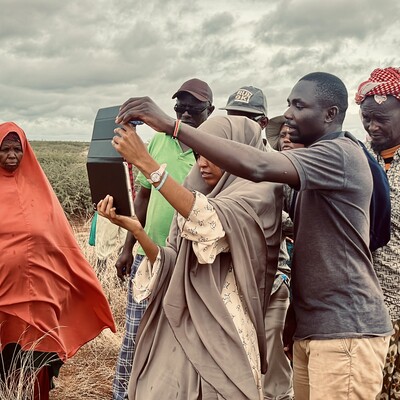
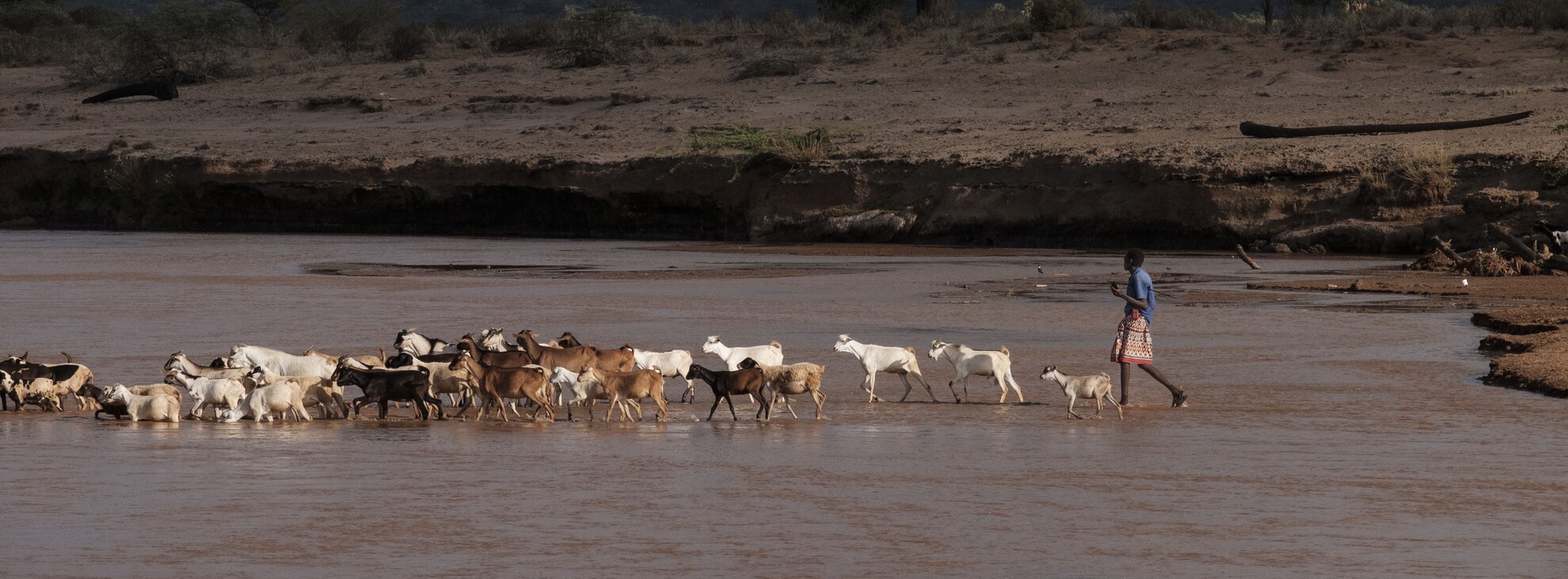
Grounded strategies for resilient rangelands: ILRI at IRC 2025
From equity to adaptation, ILRI scientists share evidence to guide smarter policies and investments
From de-risking pastoral livelihood systems to community-led restoration, researchers from the International Livestock Research Institute (ILRI) will present a diverse set of insights at the 2025 International Rangeland Congress (IRC) in Adelaide, Australia next month.
Bringing together scientists, policymakers, and practitioners from around the world, the IRC is a leading global forum to promote and share evolving rangeland knowledge and practices. The 2025 theme, Healthy Rangelands for a Healthy Future, aligns closely with ILRI’s commitment to sustainable livestock systems and resilient livelihoods in rangeland regions across Africa and Asia.
While an understanding of rangelands and their role in sustaining food systems, livelihoods, and ecosystem services is growing, these landscapes remain underfunded, undervalued, and often poorly understood – particularly in the context of climate change and demographic drivers, says Anthony Whitbread, program lead for Livestock, Climate and Environment at ILRI.
'At IRC 2025, we’ll be sharing practical strategies to improve how rangelands are managed and valued – by strengthening local institutions, backing proven approaches, developing innovative partnerships with such as the private sector, and ensuring that the pastoral communities who depend on these lands and have long cared for them, have a seat at the table.'
Mobilizing investment, data and partnerships
One way ILRI is helping shift how rangelands are valued is through the Sustainable Investments for Large-Scale Rangeland Restoration (STELARR) project – a GEF-funded, IUCN-implemented and ILRI-executed initiative that channels private sector investment into restoring degraded rangelands by strengthening sustainable livestock value chains. At IRC 2025, STELARR will host a pre-Congress workshop and panel discussion to share practical tools that support this vision – including global rangeland monitoring standards and data platforms designed to help industries, like those in the cashmere trade, reinvest in the landscapes their profits depend on.
This year’s congress also takes place in the lead-up to the International Year of Rangelands and Pastoralists (IYRP) in 2026. As a key supporter of the IYRP, ILRI sees IRC 2025 as an opportunity to continue raising the global profile of rangelands and pastoralism – bringing decades of field-based research into conversations that can shape policy and investment ahead of this milestone year.
Highlights from ILRI’s contributions at the 12th International Rangelands Congress will include:
A vision for climate-smart and resilient livestock system in the global South
ILRI’s Director General, Appolinaire Djikeng will present the ILRI and CGIAR vision for supporting pastoralism across the globe with integrated science, partnerships with national governments, capacity building and attracting investment into the neglected area of livestock systems.
Wealth creation, income distribution, and adaptation among Sahelian pastoralists
Abdrahmane Wane will share how pastoral households in the Sahel diversify their income strategies and adapt to growing shocks, offering evidence to reframe poverty narratives around pastoralism.
The structurant role of rangeland products in the West African livestock supply chain
Also by Wane, this second presentation showcases how rangeland-derived products – like milk, meat, and hides – anchor regional markets and shape supply chain dynamics.
Bridging gender gaps in rangeland resource and conflict mapping
Ambica Paliwal will present a case study from Kenya on how participatory GIS methods can surface gendered perspectives and improve the design of inclusive resource maps and land conflict mitigation.
Resilience in practice: reexamining mobility and social solidarity for climate adaptation
Tahira Mohamed explores how pastoral mobility and traditional support systems are adapting to repeated climate shocks – and why stronger support is needed to help communities face an increasingly volatile future.
Joint village land use planning across administrative boundaries
Fiona Flintan shares lessons from Tanzania where cross-boundary land use planning has successfully protected key grazing lands and water sources, offering a scalable model for participatory governance.
Participatory rangeland management (PRM): from concept to continental scaling
Also by Flintan, this second presentation describes the history of PRM implementation to date in East Africa, lessons learned and implications for scaling across Africa.
Developing a community-based rangeland health system in Ethiopia
Gedda Abule will present the innovative ILRI-led piloting of community-based rangeland health workers in Ethiopia, an innovation developed as part of the project HEAL (One Health Units for Human, Environment Animal and Livelihoods) that is testing out an integrated one health system for pastoralist areas.
Re-seeding on highly degraded rangeland as a strategy for forage production, biodiversity and carbon sequestration in Ethiopia
Bedasa Eba will present ongoing restoration work in the southern rangelands of Ethiopia working with pastoralist communities, with lessons for application elsewhere.
Unlocking the potential of communal grazing lands
Jason Sircely will highlight how capacity building across local governments, NGOs, and pastoral communities, paired with co-designed management practices, can help restore communal grazing areas, making them more productive and equitable.
Strategies for building resilient pastoral and agropastoral systems in Africa
Anthony Whitbread will present on policy and institutional shifts needed to support climate-resilient livestock-based livelihoods, drawing on recent work from ILRI’s collaborations in East and West Africa.
See the full conference program here.
Together, these contributions reflect ILRI’s long-standing engagement with rangeland systems as a foundation for food security, climate adaptation, and inclusive growth.
Stay tuned for updates from the Congress as our scientists take the stage in Adelaide.
You may also like

ILRI News
Empowering every voice: Participatory GIS can transform resource management and gender inclusion. Case story of Isiolo County, Kenya

ILRI News
How much carbon can Kenyan grasslands store in their soils? Insights from the CarboGrass Project

ILRI News
Goats with aprons? A traditional anti-mating innovation used by Maasai communities in Tanzania
Related Publications
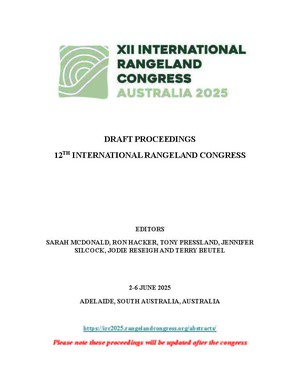
Resilience in practice: Re-examining social assistance and collective solidarity for climate change adaptation
- Mohamed, Tahira Shariff
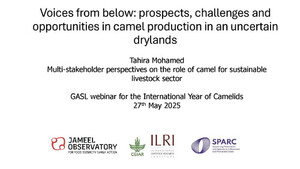
Voices from below: prospects, challenges and opportunities in camel production in an uncertain drylands
- Mohamed, Tahira Shariff

Weathering conflict: The effect of resource shocks on livestock raids
- Jensen, Nathaniel D.
- López-Rivas, Jose D.
- Morsink, Karlijn
- Rikken, Emma E.
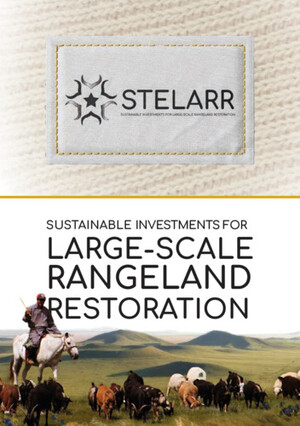
STELARR: Sustainable Investments for Large-Scale Rangeland Restoration
- International Livestock Research Institute







